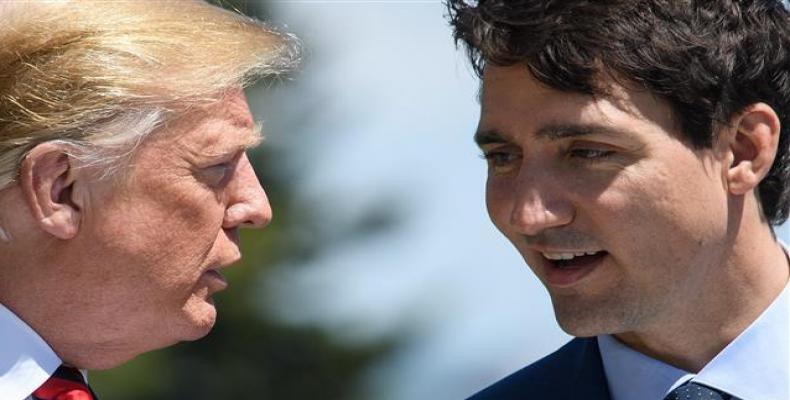Ottawa, June 11 (RHC)-- The row between the U.S. and Canada has escalated in the wake of the recent G-7 summit. Donald Trump departed early from Quebec, where the G-7 leaders were gathering, on Saturday, saying a more urgent priority for him was an upcoming face-to-face meeting with North Korea's Kim Jong-un in Singapore.
He tweeted again later about the G-7 from Air Force One, questioning the text of the final statement of the summit of the wealthy nations and saying that the U.S. would not sign it. The move led to back and forth jabbing by officials from the U.S. and Canada.
Top White House advisers lashed out at Canadian Prime Minister Justin Trudeau a day after U.S. President Donald Trump called him "very dishonest and weak." White House economic adviser Larry Kudlow, for his part, accused Trudeau of betraying Trump with "polarizing" remarks.
Trade adviser Peter Navarro also caught the media attention by appearing on CNN, where he attacked the Canadian premier. "There is a special place in hell for any leader that engages in bad faith diplomacy with President Donald J Trump and then tries to stab him in the back on the way out the door and that's what bad-faith Justin Trudeau did with that stunt press conference, that's what weak, dishonest Justin Trudeau did," Navarro said.
Canadian Foreign Minister Chrystia Freeland responded to the assault by saying that such attacks are not helpful. "Canada does not conduct its diplomacy through ad hominem attacks -- and we refrain particularly from ad hominem attacks when it comes from a close ally," Freeland told reporters in Quebec City.
European allies of Canada, meanwhile, are coming out in defense of the Group of Seven communique as well as the Canadian Prime minister.
Dispute between U.S. and Canada escalates as Trudeau is censured

Matérias relacionadas
Comentários
Deixe um comentário
Todos os campos são requeridos
Reproduzindo agora
24 Horas en el mundo
A seguir
- Desde Mi Habana
- La Trova Cubana
- Un lugar para la poesía
Mais vistas
- Playa Girón: a vitória de Cuba sobre o imperialismo
- Venezuela descreve comunicado do Equador como grosseiro e mal-armado
- A arte das estátuas vivas em Cuba
- EUA informam Rússia sobre consultas com representantes da Ucrânia em Paris
- Díaz-Canel preside cerimônia que marca 64º aniversário da vitória em Girón

